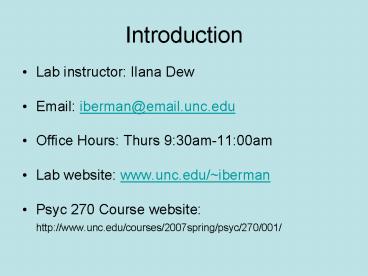Lab instructor: Ilana Dew - PowerPoint PPT Presentation
1 / 13
Title:
Lab instructor: Ilana Dew
Description:
Due: Tuesday, January 16, at the beginning of lab (8:00am) ... to will remain in memory, whilst one inattentively allowed to pass will leave no ... – PowerPoint PPT presentation
Number of Views:52
Avg rating:3.0/5.0
Title: Lab instructor: Ilana Dew
1
Introduction
- Lab instructor Ilana Dew
- Email iberman_at_email.unc.edu
- Office Hours Thurs 930am-1100am
- Lab website www.unc.edu/iberman
- Psyc 270 Course website
- http//www.unc.edu/courses/2007spring/psyc/270/00
1/
2
Assignment 1
- Due Tuesday, January 16, at the beginning of lab
(800am) - Max Length One page, typed double spaced
- Grading 6 points.
- Write a research problem statement on a
psychological topic of your own choosing - By the end of the semester you must complete an
experimental research project of your own design,
so this first assignment can be a good way to
start you thinking about your final project - (1) Begin with a broad statement of a topic in
psychology - (2) Refine that into a more specific research
question - Make sure you explicitly state what your
variables are, what kind each is (IV or DV), and
how you might operationally define them
3
One Example
Topic Memory
Whatever future conclusions I may reach as to
this, I cannot deny that an object once attended
to will remain in memory, whilst one
inattentively allowed to pass will leave no
traces behind. italics in original (James,
1890, p. 427).
What is the theory/hypothesis of interest? What
predictions could I make? How could I test
this? What are my variables of interest and how
do I define them?
4
Constructs
- What is a construct?
- An abstract, and in our case psychological,
entity that we are interested in studying - Examples?
- Memory, attention, extroversion, conservatism,
depression, anxiety, etc. - These are the same as your variables of interest
- Independent vs. dependent vs. classification
5
- The Problem
- We cannot directly study psychological constructs
- The Solution
- We need to define the construct (variable) with
respect to the manner in which we will study it - We call this an operational definition and it
allows us to indirectly study the variable
6
Operationalizing Variables
- Operational definition
- The set of procedures used to measure or
manipulate a variable - Variables can be defined by use and by nature
7
Operationalizing variables
- Our Example
- The amount of attention paid to a set of stimuli
during learning is manipulated to determine the
effect on later memory - What are our variables?
- Independent (manipulated) attention level
- Dependent (measured) memory performance
8
Operationalizing variables
- Operationalized IV description of the techniques
used for manipulating the level of attention - Attention condition
- Full attention learn words in isolation
- Divided attention learn words while doing a
second task (e.g. counting backwards from 100 in
7s) - Operationalized DV description of measurement of
memory performance - of words recalled or recognized
- Reaction times of responses
9
Divided attention vs. Full attention
IV Attention
The role of attention in memory
of words recalled or Reaction time
DV Memory
10
Operationalizing variables
- Other variables are defined by nature
- Classification variables
- e.g., age, sex, class in school
- Example
- Age-differences in memory performance
- Operationalized classification variable
- Age younger adults (18-35) vs. older adults (65)
11
Operationalizing variables
- Many variables can be operationalized in multiple
ways - The way a variable is operationalized often
depends on the research question - Example
- If you were interested in age-related memory
performance, you might compare younger adults
(18-25) vs. older adults (65). - If you are interested in age and physical health
risks, you might compare adults in their 20s to
adults in their 30s to adults in their 40sand so
on.
12
Assignment 1
- How to proceed
- (1) Start with a theory or hypothesis
- This can be found in a prior psychology class, or
from Psychological Science or Current Direction
in Psychological Science - (2) Generate predictions from this theory or
hypothesis (all theories must necessarily make
predictions) - (3) Think of how you might test these predictions
- What would your variables be and how would you
operationally define them?
13
Some practice
- A class exercise
- A theory of helping behavior posits that the
decision to help others depends on a cost/benefit
analysis A person will help others if the
benefits of helping outweigh the costs of
helping. - How can you test this idea?
- How could you manipulate either the cost of
helping, or the benefit of helping, for the
purpose of an experiment? How would you
operationalize and measure helping behavior?
What classification variables might be of
interest?































